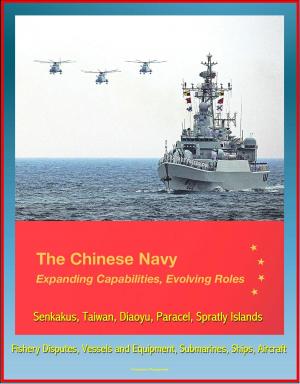Air Superiority in World War II and Korea: Interviews with Generals, Late 1940s, Korean War, Ultra Secret Intelligence, Field Manual 100-20, Command and Employment of Air Power, July 21, 1943
Nonfiction, History, Military, Aviation, World War II| Author: | Progressive Management | ISBN: | 9781311679833 |
| Publisher: | Progressive Management | Publication: | November 7, 2014 |
| Imprint: | Smashwords Edition | Language: | English |
| Author: | Progressive Management |
| ISBN: | 9781311679833 |
| Publisher: | Progressive Management |
| Publication: | November 7, 2014 |
| Imprint: | Smashwords Edition |
| Language: | English |
The publication of Air Superiority in World War II and Korea is part of a continuing series of historical studies from the Office of Air Force History in support of Project Warrior.
Project Warrior seeks to create and maintain within the Air Force an environment where Air Force people at all levels can learn from the past and apply the warfighting experiences of past generations to the present. When Gen. Lew Allen, Jr., initiated the project in 1982, he called for the "continuing study of military history, combat leadership, the principles of war and, particularly, the applications of air power." All of us in the Air Force community can benefit from such study and reflection. The challenges of today and the future demand no less.
In November 1981, Lt. Gen. Hans H. Driessnack, Assistant Vice Chief of Staff, asked the Historical Program to assemble a small number of retired officers for a group oral history interview. General Driessnack believed that in reminiscing together, these officers would recall incidents and experiences that might otherwise go unrecorded; by exchanging ideas and questioning each other—in effect, interviewing each other—they would recall material that would be of interest and importance to the Air Force today. General Driessnack also suggested selecting retired officers from the senior statesman conference, a gathering every spring at which retired four-star generals are briefed on Air Force issues and then discuss them with contemporary Air Force leaders.
The result is the following interview. The four participants—Gen. James Ferguson, Gen. Robert M. Lee, Gen. William W. Momyer, and Lt. Gen. Elwood R. "Pete" Quesada—gathered on May 21, 1982, around a table in the Vandenberg room at the Boiling Air Force Base Officers' Club. For approximately two and one half hours they responded to questions sent to them earlier and discussed air superiority in World War II and Korea. Their discussions ranged far and wide: flying in the pre-World War II Army Air Corps, campaigning in North Africa and Western Europe in World War II, planning and participating in the Normandy invasion, using secret intelligence supplied by Ultra, struggling to codify tactical air doctrine in the postwar years, fighting the air battle in Korea, and thinking about the general problem of air superiority throughout their careers. This collective interview is not history but the source material on which history rests; it is a memoir, a first-hand account by air leaders who flew, fought, and commanded tactical air forces in combat.
Combat memoirs are usually exciting, vivid, and filled with colorful anecdotes. That is true for this oral interview, except that the discussions are focused on only one topic: air superiority. The Historical Program chose air superiority because it is a crucial first element in all air operations and because it seemed to be neglected by a military establishment that so quickly dominated enemy air forces in the last two wars. There is a need to know more about air superiority: what it means, when it is necessary, and how it can be achieved operationally when the airspace is contested. The careers of each of the participants reveal a long association with air superiority—the theories and operations.
The publication of Air Superiority in World War II and Korea is part of a continuing series of historical studies from the Office of Air Force History in support of Project Warrior.
Project Warrior seeks to create and maintain within the Air Force an environment where Air Force people at all levels can learn from the past and apply the warfighting experiences of past generations to the present. When Gen. Lew Allen, Jr., initiated the project in 1982, he called for the "continuing study of military history, combat leadership, the principles of war and, particularly, the applications of air power." All of us in the Air Force community can benefit from such study and reflection. The challenges of today and the future demand no less.
In November 1981, Lt. Gen. Hans H. Driessnack, Assistant Vice Chief of Staff, asked the Historical Program to assemble a small number of retired officers for a group oral history interview. General Driessnack believed that in reminiscing together, these officers would recall incidents and experiences that might otherwise go unrecorded; by exchanging ideas and questioning each other—in effect, interviewing each other—they would recall material that would be of interest and importance to the Air Force today. General Driessnack also suggested selecting retired officers from the senior statesman conference, a gathering every spring at which retired four-star generals are briefed on Air Force issues and then discuss them with contemporary Air Force leaders.
The result is the following interview. The four participants—Gen. James Ferguson, Gen. Robert M. Lee, Gen. William W. Momyer, and Lt. Gen. Elwood R. "Pete" Quesada—gathered on May 21, 1982, around a table in the Vandenberg room at the Boiling Air Force Base Officers' Club. For approximately two and one half hours they responded to questions sent to them earlier and discussed air superiority in World War II and Korea. Their discussions ranged far and wide: flying in the pre-World War II Army Air Corps, campaigning in North Africa and Western Europe in World War II, planning and participating in the Normandy invasion, using secret intelligence supplied by Ultra, struggling to codify tactical air doctrine in the postwar years, fighting the air battle in Korea, and thinking about the general problem of air superiority throughout their careers. This collective interview is not history but the source material on which history rests; it is a memoir, a first-hand account by air leaders who flew, fought, and commanded tactical air forces in combat.
Combat memoirs are usually exciting, vivid, and filled with colorful anecdotes. That is true for this oral interview, except that the discussions are focused on only one topic: air superiority. The Historical Program chose air superiority because it is a crucial first element in all air operations and because it seemed to be neglected by a military establishment that so quickly dominated enemy air forces in the last two wars. There is a need to know more about air superiority: what it means, when it is necessary, and how it can be achieved operationally when the airspace is contested. The careers of each of the participants reveal a long association with air superiority—the theories and operations.















